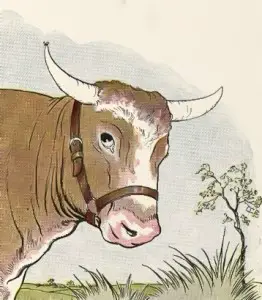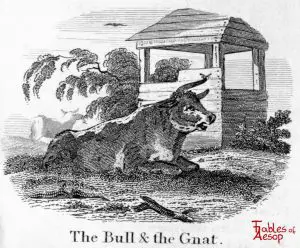A Gnat settled on a Bull. Before the Gnat left he asked the Bull if he could go. The Bull did not care as he had not even noticed the Gnat had some.
Some men are of more consequence in their own eyes than in the eyes of their neighbors.

Aesop For Children
A Gnat flew over the meadow with much buzzing for so small a creature and settled on the tip of one of the horns of a Bull. After he had rested a short time, he made ready to fly away. But before he left he begged the Bull’s pardon for having used his horn for a resting place.
“You must be very glad to have me go now,” he said.
“It’s all the same to me,” replied the Bull. “I did not even know you were there.”
Moral
We are often of greater importance in our own eyes than in the eyes of our neighbor.
The smaller the mind the greater the conceit.

Townsend version
A gnat settled on the horn of a Bull, and sat there a long time. Just as he was about to fly off, he made a buzzing noise, and inquired of the Bull if he would like him to go. The Bull replied, “I did not know you had come, and I shall not miss you when you go away.”
Moral
Some men are of more consequence in their own eyes than in the eyes of their neighbors.

Jefferys Taylor
ON the horn of a bullock alighted a gnat;
To which it is likely you’ll say “What of that?”
I’ll tell you: this insect thought he was so great,
That the beast must be weary with bearing his weight.
“I’m afraid that my pressure disturbs you,” said he,
“You must feel much oppressed by a person like me;
But if for five minutes you’ll let me remain,
I’ll remove to some tree which my weight can sustain.”
“Sit still and be quiet, I pray,” said the beast,
“Your weight does not burden my neck in the least;
Indeed I knew not of your coming, and so
Shall not miss you whene’er you think proper to go.”
Tis the most insignificant persons, we see,
Who suppose themselves folks of importance to be.

JBR Collection
A sturdy Bull was driven by the heat of the weather to wade up to his knees in a cool and swift-running stream. He had not been long there when a Gnat, that had been disporting itself in the air, pitched upon one of his horns. “My dear fellow,” said the Gnat, with as great a buzz as he could manage, “pray excuse the liberty I take. If I am too heavy, only say so, and I will go at once and rest upon the poplar which grows hard by at the edge of the stream.” “Stay or go, it makes no matter to me,” replied the Bull. “Had it not been for your buzz I should not even have known you were there.”
[Note: The JBR Collection had a second version of this fable in poetic form reproduced here.]
The Ox and The Fly
While grazed a stately Ox one sultry morn,
A weary Fly sat perching on his horn:
She thought, with high-swollen vanity elate,
Hcr bulk gigantic, mountainous her weight;
And her exhausted strength repaired by rest.
Thus to the Ox her gentle voice addressed:
“Faint you beneath my load? kind creature, say;
Then will your grateful servant fly away.”
The Ox, still browsing, unconcerned replied,
“Who’s there, that feebly speaks a-near my side?”
“‘Tis I, the sister of the fertile Spring,
And sister of the bird whose royal wing
Bore the fair youth from Ida’s sacred grove,
And flew, unfainting, to the throne of Jove.
But now revived, receive my homage due;
Say, shall my vigorous wings their flight renew?
For from this pondcrous ‘cumbrance you sustain,
Your moistened pores must breathe from every vein.”
The Ox, amused, resumed, “O gracious Fly,
Beneath thy weight I faint, alas! I die.
Go–tell thy kindred while their ister rode,
No conscious nerve perceived the feeble load.”
When Self-importance lights her secret flame
She gives each empty fool a glorious name:
Bright shines the coxcomb–to himself alone;
By all the world beside unnoticed and unkn0wn.

Taurus et Culex
Culex tauri occupaverat cornu, si scilicet eum onere suo posset deprimere. Cum vero taurus id prorsus neglexisset, culex inde cupiens avolare, extremis exploratis viribus, “Si,” inquit, “molestus sum tibi, onere te levabo avolans.” Respondet taurus, “Nec te, cum accessisses, sensi; nec sentiam, si rursus abieris.”
Perry #137


